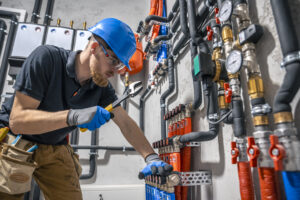Staying ahead of the curve in technological advancements is crucial in the field of HVAC. From revolutionary systems that have redefined efficiency to cutting-edge solutions that improve the quality of indoor air, this intricate domain is undergoing a transformation. In this exhaustive exploration, we’ll venture through the historical milestones, current breakthroughs, and the exciting future that lies ahead in HVAC technology. Whether you’re a homeowner looking to upgrade your system or a professional seeking to expand your industry knowledge, this deep-dive will provide a panoramic view of the tech shaping the air you breathe at home.
Evolution of HVAC Technology
The history of heating, ventilation, and air conditioning systems is an evolving narrative of human comfort and architectural design. What began with rudimentary heating methods has blossomed into an intricate interplay of mechanics and digital interface.
From Ancient Techniques to Modern Marvels
Visit any ancient civilization, and you’ll find the seeds of HVAC ingeniously sown into their architecture. Be it the hypocaust systems of ancient Rome or the wind catching towers of Persia, early engineers were already meditating on the art of comfortable room temperature. Yet, it was the industrial revolution that catapulted HVAC into the modern era, with the discovery and application of refrigeration processes leading the charge.
The Game-Changing Milestones
The 20th century was rife with game-changing HVAC innovations. The first electric air conditioner, introduced in 1902, heralded the commodification of cool air. The energy crisis of the 1970s birthed a new consciousness around energy efficiency, leading to the development of Programmable Thermostats. The 90s and 2000s were marked by the growth of VRF systems, introducing variable refrigerant flow and cutting-energy consumption.
Current Trends in HVAC Technology
Today’s HVAC landscape is a tapestry of innovation, responding to the growing demand for efficient, sustainable, and health-conscious air solutions.
Smart HVAC Systems
Smart technology heralds a new age in home comfort. HVAC systems are becoming increasingly intelligent, adapting to the homeowners’ schedule and the environment’s needs. Smart thermostats like Nest and ecobee have become household names, offering control through mobile apps and learning algorithms, fine-tuning indoor conditions while slashing energy usage.
Energy Efficiency Innovations
The global call for environmental conservation has permeated the HVAC industry, leading to a wave of innovations that focus on energy efficiency. From inverter-driven compressors that modulate speed to match the load, to advanced HVAC zoning systems that allow for room-by-room climate control, these technologies optimize energy usage without compromising comfort.
Air Quality Improvement
In a world more conscious of air contaminants, HVAC technology is advancing to provide cleaner, healthier air indoors. Next-generation air purifiers, such as those utilizing UV-C light for microbe sterilization, and hybrid heat pump systems that not only cool and heat but also filter allergens, represent a quantum leap in air quality management.
Future of HVAC Technology
The future promises to be the most exciting chapter in HVAC technology yet, with breakthroughs on the horizon that could redefine the very concept of indoor climate control.
Anticipated Breakthroughs
Tomorrow’s HVAC systems are expected to be even more responsive to a breadth of environmental factors, potentially harnessing renewable energy sources or even relying on revolutionary cooling tech like magnetic refrigeration, which eliminates the need for harmful gases.
AI and Machine Learning
The use of AI and machine learning will reach new heights, with HVAC systems capable of learning from user behavior and self-optimizing for personalized comfort and efficiency. We’re on the brink of a future where predictive maintenance schedules will be the norm, ensuring minimal system downtime.
Impact on Homeowners
For homeowners, the benefits of the HVAC technology revolution are clear – better comfort, lower energy bills, and a safeguard for family health.
The Comfort Quotient
Modern HVAC systems can adjust temperatures with unprecedented precision, maintaining a perfect climate within the home. The flexibility of zoning systems allows different parts of the house to be at different temperatures, ensuring that everyone’s comfort levels are met.
Savings and Sustainability
Energy-efficient HVAC systems promise significant savings on utility bills. Homeowners can also take pride in adopting technologies that reduce their carbon footprint, contributing to a healthier planet.
Health at Home
Improved air quality systems can relieve allergy symptoms and safeguard respiratory health. Premium filters, air purifiers, and dehumidification systems create an environment that nurtures wellness.
Impact on HVAC Professionals
The industry professionals serving in HVAC have a dual challenge and opportunity – to keep up with the rapid advancements while harnessing the potential for growth.
Lifelong Learning: The Key to Success
In an industry where change is the only constant, continuous learning is non-negotiable. Professionals need to familiarize themselves with the latest technologies and stay updated with the ongoing innovations.
New Horizons to Explore
With every new development, the horizon of possibilities widens. HVAC technicians can now explore fields such as renewable energy, digital control systems, and advanced diagnostics, offering a more diverse and fulfilling career path.
Integrating New Tech: A Balancing Act
Adopting new technologies requires a delicate balance of integrating them into existing practices while ensuring that the service provided is of the highest standard. Professionals must be adept at implementing and troubleshooting the latest HVAC gadgets and systems.
In conclusion, the HVAC industry is at a technological crossroads, with a profoundly exciting road ahead. For both homeowners and professionals, the key to navigating this shifting landscape lies in being proactive and adaptable. Whether you’re controlling the climate in your living room or working behind the scenes to ensure that the technology operates seamlessly, the latest trends in HVAC technology are set to elevate the standards of home comfort to unprecedented levels.






